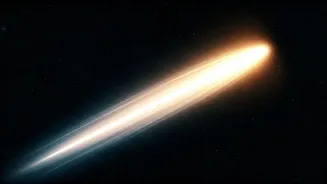The Atlas Comet Emerges
The 3I/ATLAS comet has grabbed the attention of the scientific community and the public alike, as the warning from the Harvard astrophysicist surfaced.
This comet is the focus of an intriguing debate. The astrophysicist's advice to take vacations before October 29th is a direct response to discussions surrounding the comet's unusual characteristics. This warning emphasizes the importance of understanding the potential impact of astronomical phenomena and the need for preparedness.
Artificial Origin Speculation
The astrophysicist's warning is fueled by debate concerning the comet's origin. The central question is whether its nature is entirely natural or potentially influenced by artificial means. The idea that a celestial body could have a non-natural origin challenges established understandings of cosmic events. The discussions probe the limits of our knowledge and technology while raising concerns about how humankind's advancements could affect the cosmos. This speculation adds a layer of mystery and urgency to the situation.
October 29th: A Deadline?
The suggested date of October 29th, in the context of the warning, has raised significant questions and interpretations. The call to take vacations before this date is unusual, intensifying curiosity about what might happen on or around this specific day. The potential for the comet to impact our planet, or the implications of its origin, could be factors contributing to the warning. Considering this time frame is an important aspect of understanding the significance of the astrophysicist's insights.
Scientific and Public Interest
The Harvard astrophysicist's warning has not only captured the attention of the scientific community but also ignited public curiosity. The unique nature of this scientific discussion is creating a broader interest in space exploration. This interest reflects an underlying curiosity about the universe, its mysteries, and the possibility of our involvement in cosmic events. This attention encourages discussions around scientific developments and their wider implications, making space exploration and research more accessible to everyone.




















